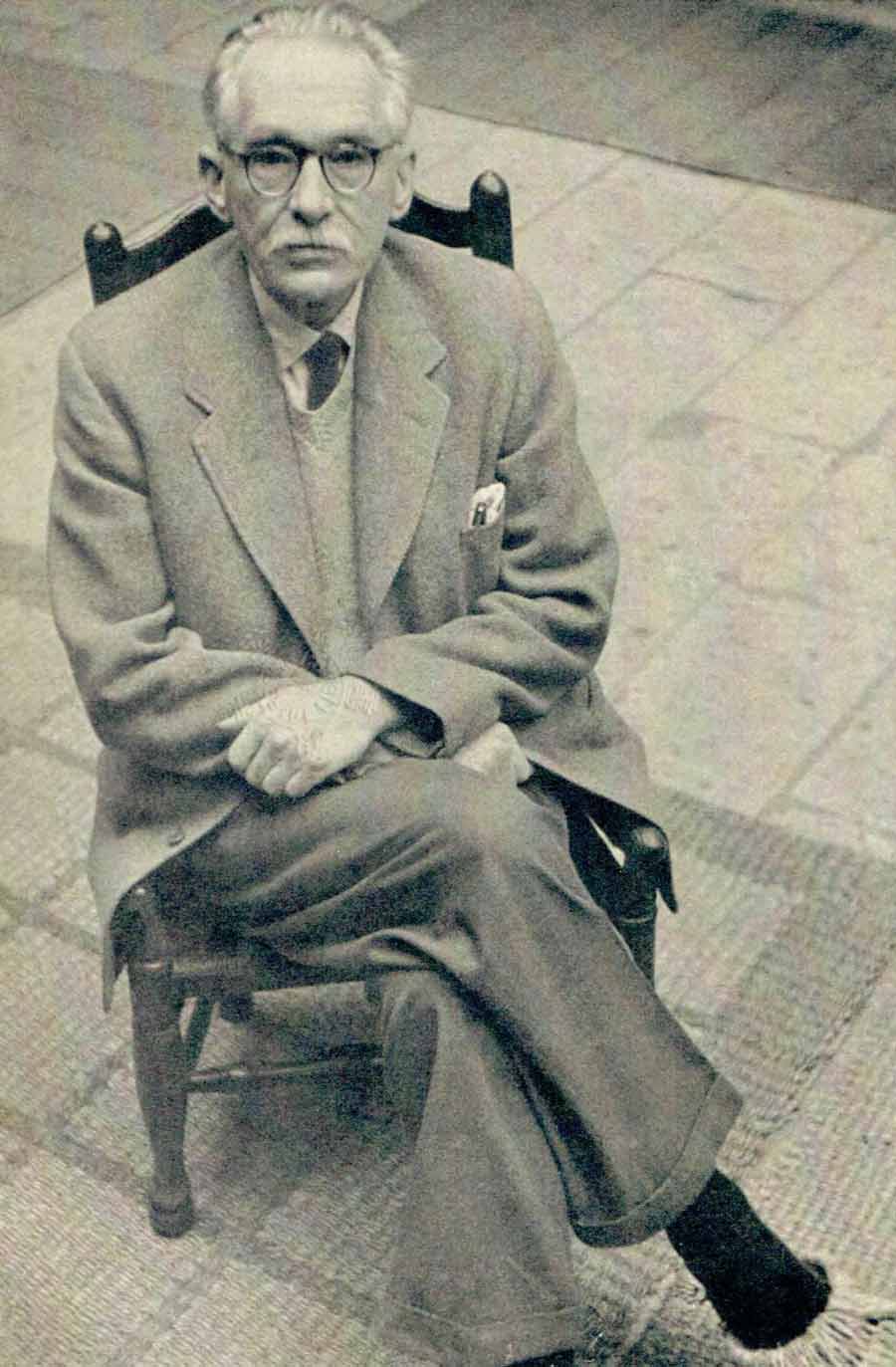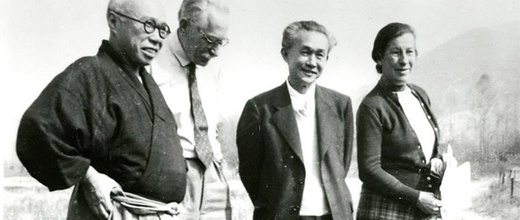The views expressed in our content reflect individual perspectives and do not represent the authoritative views of the Baha'i Faith.
The great potter and artist Bernard Leach was fascinated by the rules of aesthetics, geometry, and beauty, and how they contributed to abstract thought and human consciousness.
His work, characterized by the use of bold, natural glaze colors applied with wide brush strokes, spoke to the soul and was a reminder of centuries-old tradition. His treatise A Potter’s Book reflected the beauty and functionality that Leach believed to be at the heart of pottery, and introduced the idea of the “ethical pot,” rooted in beauty, simplicity and utility:
Very few people in this country think of the making of pottery as an art, and amongst those few the great majority have no criterion of aesthetic values which would enable them to distinguish between the genuinely good and the meretricious. Even more unfortunate is the position of the average potter, who without some standard of fitness and beauty derived from tradition cannot be expected to produce, not necessarily masterpieces, but even intrinsically sound work. – Bernard Leach, A Potter’s Book, 1940.

Bernard Leach
Following the Second World War, Leach toured his artwork and publications through much of the UK, the United States, Scandinavia and Japan, eager to share his experiences in cooperative craftsmanship that focused on meeting the needs of the people. He believed that the value and beauty of pottery came from the life behind the work. The unity of groups of artists from around the world, coming together to create something normal and useful, was beautiful to Leach. He despised the industrialization and mechanization of ceramics that perpetuated the loss of culture, heritage and productivity. He was even more disappointed when he reached the United States:
We encountered thousands of self conscious individual craftsmen without root and without the desire or capacity to cooperate …. my distaste with overstressed individualism grew stronger. I admire most the art in which there is a power greater than that of the individual, less of the desire to shine, for It shines, not me. – My Religious Faith, Bernard Leach, p. 4.
Leach believed that artists with experience should be willing mentors and leaders:
He can, and should, I believe, if he is unselfish and has a capacity for leadership, gather a team and work in a group for that is the nature of most hand-crafts…. But any man does not live and work in that way unless he is in deep unity with his fellows, unless he shares faith with them. – Ibid., p. 5.
Leach was deeply concerned by the urgency for unity and believed that religion, rather than art, offered the primary foundation for unity. These words of Baha’u’llah highlight Leach’s sentiments and the need for religion to bring about unity:
I bear witness to Thy unity and Thy oneness, and that Thou art God, and that there is none other God beside Thee. Thou hast, verily, revealed Thy Cause, fulfilled Thy Covenant, and opened wide the door of Thy grace to all that dwell in heaven and on earth. Blessing and peace, salutation and glory, rest upon Thy loved ones, whom the changes and chances of the world have not deterred from turning unto Thee, and who have given their all, in the hope of obtaining that which is with Thee. Thou art, in truth, the Ever-Forgiving, the All-Bountiful. – Baha’u’llah, Baha’i Prayers, pp. 5-6.
In 1953 Leach published a brochure printed on handmade paper titled My Religious Faith, which describes his reasons for becoming a Baha’i. Despite having formally accepted the Baha’i Faith, Leach remained private on one issue: he was still not fully convinced of the station of Baha’u’llah and his claims to be a divine messenger of God. Leach’s sudden acceptance of Baha’u’llah as a divine educator came following an inner realization that unity was the only solution to meeting the needs of society, and that perfect unity came from faith. My Religious Faith became Leach’s first formal and public declaration as a Baha’i and believer in Baha’u’llah’s teachings:
A religion produces a culture: A culture produces characteristic traditions and arts. But religions are not produced synthetically. They have been given out by the Great Prophets, whom Baha’is call Manifestations, who claim a Divine Source of Inspiration. I believe that Baha’u’llah was a Manifestation and that His work was to provide the spiritual foundation upon which the society of mankind could be established. – Bernard Leach, My Religious Faith, p. 5
Throughout the late 1950’s and into the 60’s, Leach continued to publish more books and offer lecture tours. In 1961 The Arts Council of Britain held a retrospective exhibition called “Fifty Years a Potter,” where he was recognized as a master craftsman and his work became the benchmark for Western pottery. Leach was made the Commander of the Order of the British Empire in 1962 and 1973 for his contributions to the arts. He was also bestowed the Companion of Honour at Buckingham Palace in the presence of Queen Elizabeth.
Leach was also awarded the Order of the Sacred Treasure 2nd Class in Japan, the highest honor Japan bestows on a foreigner. While Leach received accolades, he continued to travel to countries like Australia, New Zealand, Japan, Colombia, Venezuela, Honduras and the US, offering lectures and workshops, highlighting his experience and ultimately, the origins of his inspiration, his belief in the Baha’i Faith.
In the 70’s Leach published two books—Drawing, Verse and Belief, and Beyond East and West: Memoirs, Portraits, and Essays, both of which shared a considerable amount on the influence of the Baha’i Faith on his work. In 1977, on the year of his 90th birthday, a retrospective of his work was exhibited at the Victoria and Albert Museum and he offered a talk to visitors titled “My life, my work and my belief.”
Sadly, in 1974, Leach suddenly experienced the loss of his eyesight, which brought his pottery days to an end. Before he lost complete sight, he wrote these poetic words for a friend, a glimpse of sorrow but also spiritual awakening:
Come blindness
With the dawn this day.
Not to see a human face again.
Not to see a line on paper drawn.
Warning, yes, but both this day.
Groping along walls,
Premonitory steps.
Awake, awake, the inner eyes,
Love more, not less,
The memories of human sight,
See with, not through. – Bernard Leach, cited in Remembering Bernard Leach, by Trudi Scott, The Baha’i World, Volume 18, pp. 929-931.
Despite losing his vision, Leach continued to inspire those around him. He continued to share his love for the Baha’i Faith with all he met, never shying away from the divine inspiration behind his signature work and its expression of the oneness of humanity. His third wife, Janet Darnell, continued to operate the day-to-day responsibilities of the Leach Pottery Studio in St Ives.
The physical life of Bernard Leach came to an end on May 6th 1979, following heart complications. He was buried at Longstone Cemetery, Carbis Bay, St. Ives. The Universal House of Justice sent a cable upon hearing of his passing:
HONOURS CONFERRED UPON HIM RECOGNITION HIS WORLDWIDE FAME CRAFTSMAN POTTER PROMOTER CONCORD EAST AND WEST ADD LUSTRE ANNALS BRITISH BAHAI HISTORY AND HIS EAGER WILLINGNESS USE HIS RENOWN FOR SERVICE FAITH EARN ETERNAL GRATITUDE FELLOW BELIEVERS. – The Baha’i World, Volume XIII, p. 671.

















Comments
Sign in or create an account
Continue with Facebookor